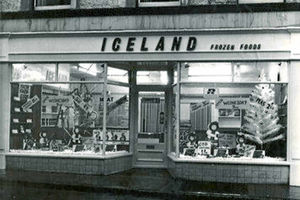Boss of Shropshire-founded Iceland backs living wage for staff
The man who founded budget food chain Iceland in Shropshire before taking it around the country has urged rival supermarkets to pay their staff the living wage.
Malcolm Walker, who opened the first branch of Iceland in Oswestry in 1970, said the big supermarkets, such as Asda and Tesco, had a 'moral' duty to pay hard-working staff higher wages.
And he dismissed as 'brainless' any suggestion that raising wages would threaten staff perks such as discount cards.
Mr Walker, 69, said Iceland – which pays staff rates of £7.12 per hour and £7.83 within the M25 – already offers workers more than the basic shop-floor wage at Sainsbury's and Waitrose.

His comments came after Chancellor George Osborne announced a new compulsory living wage of £7.20 an hour in the Budget earlier this month. He said that employers must pay at least that much to workers aged 25 and over from April, with the rate rising to more than £9 an hour by 2020.
The existing minimum wage for those over 21 is £6.50 an hour.
Mr Walker said: "Of course this is going to be painful but we'll do it with a smile on our face. I'm all in favour of this living wage and if everyone has to pay it then it's better all round and morally the right thing to do.
"We're doing it, we're enthusiastic about it and we're not saying 'take the staff discount away'."
The comment was aimed squarely at other supermarket bosses who have claimed staff would rather have their discounts and other perks than a higher wage.
Mr Walker said: "Staff just look at the rate per hour – the headline rate of pay.
"We're ahead of it anyway. But if you're going to £9 then you are talking about a 4 or 5 per cent rise for the next five years. It will be a lot worse for everyone else," he said.
Mr Walker also warned of the pressure facing retailers to lower their prices, describing 2014 as "the worst year in the 41 years I've run the business".
"Deflation on commodities is still there and on top of that there is the downward pressure on prices that the Germans are bringing into this,' he said, referring to Aldi and Lidl.



